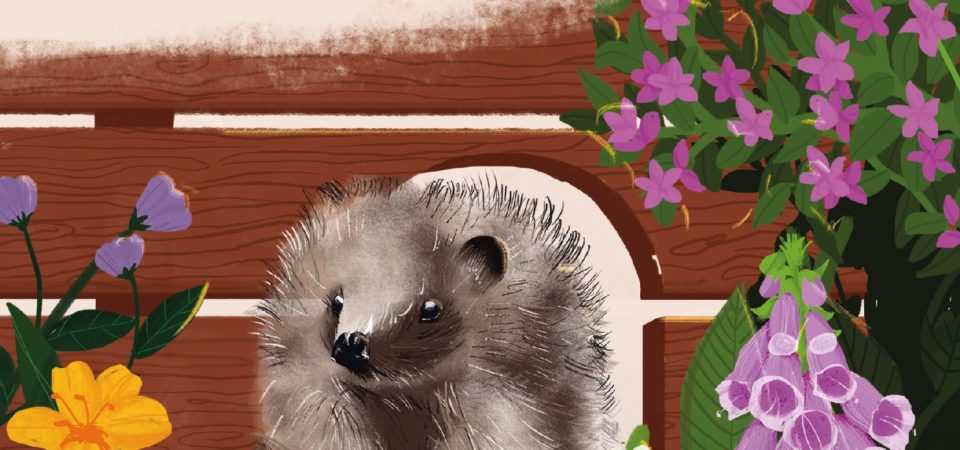Of late, I have been spending a good deal of time thinking about the importance of urban wildlife in our everyday living, and the importance of our everyday living for urban wildlife. Part of my meditating has related to how the experience of this mutualism might be particularly important for children who spend most of their time in towns and cities.
I became so eager to explore this idea that I ended up writing an eco-novel on the topic (under the pen name that I use for fiction: Dewey Dabbar). Called The Gardens of Greenspring Road, the story, which is my first novel, was published by Dixi Books in September 2021.
Most of the tale takes place in the British town of Thornlea, and the central human character is a fifteen-year-old girl of Bengali heritage who is named Mina Thakli. We follow her story as she awakens to the beauty, agency, and moral standing of the wild creatures with whom she shares her town. Mina is not one to sit idly, though: she soon finds herself committing to a clandestine nocturnal project to help one particular kind of creature (an animal depicted on the book’s cover).
That is all I will say about the plot, to avoid spoiling any of its elements for anyone who may wish to read the book, but I will share an extract below to offer a taster of the tone and style. The extract is one of several ‘vignettes’ that are dotted through the book, exploring some part of the lives of Mina’s human neighbors.
* * *
There was a large roundabout in north Thornlea, near the bingo hall, where yet another clash in that ancient battle between life and death was playing out. One of the protagonists in this skirmish was a person named Rich Baldie.
Only the second part of the appellation Rich Baldie constituted an accurate description of the man on whom it was bestowed. Retiring early, he and his wife had seen their nest egg implode and were now living through an unforeseen barren period before they could start drawing their pensions. Things might have been different were Rich not a man of principles. Or so he reported in a well-worn yarn.
He once—the tale went—did some business on the side with a man who promised that he could triple an initial investment of up to two hundred thousand pounds inside a year. The scheme being suggested was not illegal but not exactly moral either, and Rich decided that the best way to honor his commercial relationship with the man, without compromising his principles, would be to post him a cheque for one penny. Never had the word ‘only’ been so appropriately appended to the long-hand description of the payment amount.
Eleven months later, true to his word, Rich’s now-former partner sent him a cheque back in the post. The investment had outperformed his expectation: the payment was for five pence. In other words, Rich’s principles had cost him one small cupro-nickel coin short of a million.
Despite the temporary limits on their spending, the Baldies were rarely at a loose end. Rich’s wife maintained an interest in various archaic and cost-efficient practices such as knitting clothes and cooking meals from raw ingredients. Rich, meanwhile, busied himself with local politics. There was barely a day that went by without him firing off at least one email to the Thornlea town council, puffing as he typed through cheeks that a particularly unkind soul had once described as looking like they had been inflated with a bicycle pump.
A typical email of Rich’s would partner some variation on the theme of him being a taxpayer with one of his stock gripes. And the thing that peeved him the most, as judged by the proportion of his messages that concerned the topic, was unmowed verges. If he should walk past a patch of roadside vegetation that had risen three inches above the ground, he would invariably describe it as being “out of control.” At six inches, the term “like a jungle” entered his lexicon.
Rich was far from being alone in his concern for the tidiness of Thornlea’s roadside greenery. Indeed, of all the irritations that he aired in front of the crapulent regulars at the Royal Oak—while nursing a pint of cask-conditioned bitter with all the care of Florence Nightingale—this was the one most likely to elicit masculine grunts of approval. And his views on this matter were given a similarly warm reception at the nearby Thornlea Social Club. (To gain entrance to this low-key watering hole, one needed to knock on the front door. As such, it was the closest thing that Thornlea had to one of those chic speakeasy-type bars in Berlin or Barcelona, where potential clients were vetted for suitability through a hatch in the entrance. The reason for the system of entry into this social club, however, related merely to a door whose opening required a firm shove from the inside on account of stiffness.)
Heeding the wishes of their electorate on the matter of roadside vegetation, several of Thornlea’s councilors listed diligent verge management among their top three priorities for the town. Aiding their prospects of an election was the fact that wild-flowers and insects were not sent ballots.
Rich’s grumbling was backed up by action at home. His sense of aesthetics caused him to run a mower over the chemically doped lawn in his back garden more often than his vanity dragged a razor over the thin sporadic stubble on his balding pate. During the autumn, his obsession with that immaculate expanse of grass saw him press a leaf blower into regular service in order to attend to the unsightly debris that fell from a trio of cherry trees in a neighboring garden. “It’s Sod’s law”—he once moaned to his wife, with a reference to the lawn that was purely accidental—” to have a pair of bloody tree huggers move in next to us. Anyone with sense would have cut those cherries down as soon as they’d arrived.”
It was not that Rich hated the natural world. He regularly restocked a pair of bird-feeders, for instance, that hung from a stand on his patio. And the flowering shrubs in the border of his garden—which ran in front of a brick wall that he had built after the fence had blown down in a gale—gave him great pleasure. He was even known to enjoy the sight of a clump of moss—as long as it was on an old stone wall in the uplands and not sprouting from his turfed magnum opus. Crucially, with the positioning of the feeders, the location of the shrubs, and the botanical make-up of his lawn, he was in control. ‘Nature’ was in its place, and humans were on top (living a fantasy of dominance).
Rich’s eternal obsession with dominion was not shared by his wife, but she supported it insofar as it got her husband out from under her feet.
* * *
There were certain local matters for which Rich Baldie adopted a more hands-on approach to politics. One such concern saw him maintain a regular patrol of Thornlea’s streets, from spring through autumn, with his sleeves rolled up and a gun clutched in his fingers. This gun was a narrow plastic lance that was connected to a back-mounted sprayer, and he used it to shower strips of pavements and patches of municipal grass with liquid death. He had a different recipe for each of the applications: the first to kill everything back; the second to stack the odds in favor of ryegrass.
With the municipal grass, there was one such patch that was second in Rich’s heart only to his own lawn. It formed half of a circular feature, in the center of a gyratory to the north of Thornlea’s center, that had been created by the town council to mark the visit of a group of business executives from China. The original plan had been to perform a dragon dance, but there was strong local opposition to closing Smithwell Parade to traffic for half an hour, and so an ornamental display had been settled on instead. It was of a yin-and-yang design—acknowledging the cosmological interconnectedness of certain opposing forces—where one of the two interlocking swirls had been laid with turf and the other left as open soil for the planting of flowers.
* * *
The chemical attention that Rich gave the grassy half ensured that it remained a pristine monoculture. But that, as the saying goes, was only half the story. The feature’s other swirl had its own human caretaker. This person, a ‘guerrilla guardian’, was slowly converting the botanically poor plant bed into an oasis of wildflowers.
About The Gardens of Greenspring Road
The Gardens of Greenspring Road was published on 25 September 2021 by Dixi Books, a small independent publisher in the UK.
100% of the author’s royalties from the book are being donated to the World Land Trust.
 Joe is a wildlife lover who lives on a large island in the North Atlantic Ocean that an infinitesimal proportion of the Earth’s beings call Great Britain. He is Fiction Editor for The Ecological Citizen. His writing spans non-fiction and fiction. The latter he does under the pen name Dewey Dabbar, with some of it being published via an imprint called Impudent Raven. His personal website can be found at https://deepgreen.earth/.
Joe is a wildlife lover who lives on a large island in the North Atlantic Ocean that an infinitesimal proportion of the Earth’s beings call Great Britain. He is Fiction Editor for The Ecological Citizen. His writing spans non-fiction and fiction. The latter he does under the pen name Dewey Dabbar, with some of it being published via an imprint called Impudent Raven. His personal website can be found at https://deepgreen.earth/.
The MAHB Blog is a venture of the Millennium Alliance for Humanity and the Biosphere. Questions should be directed to joan@mahbonline.org

